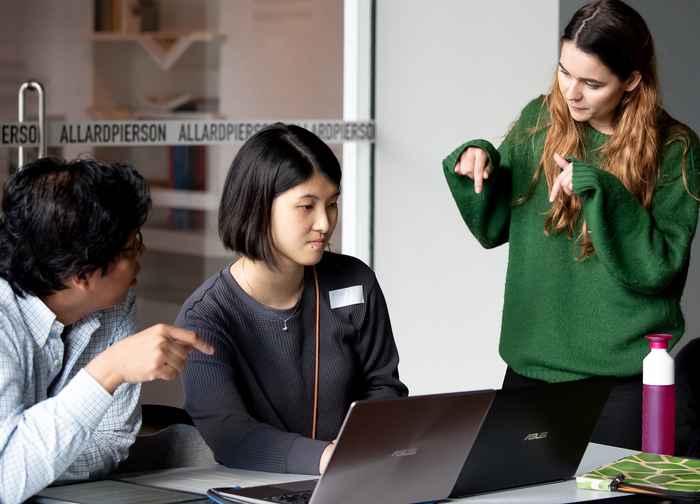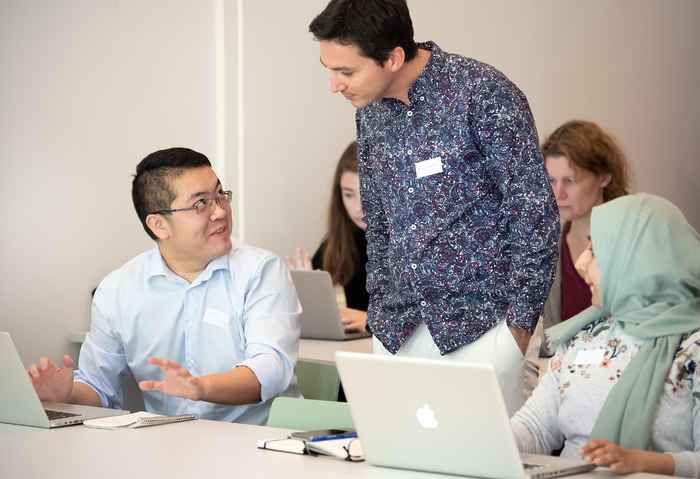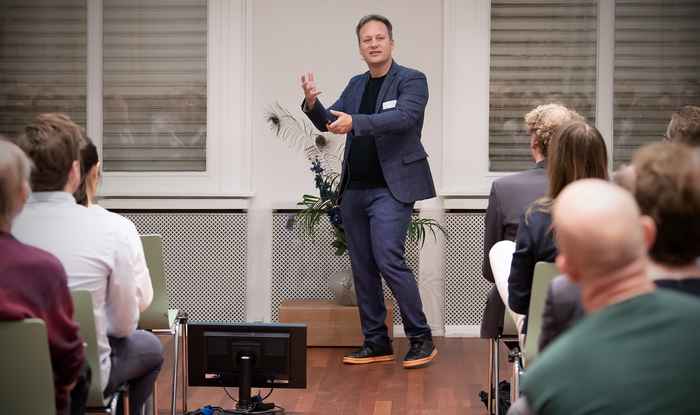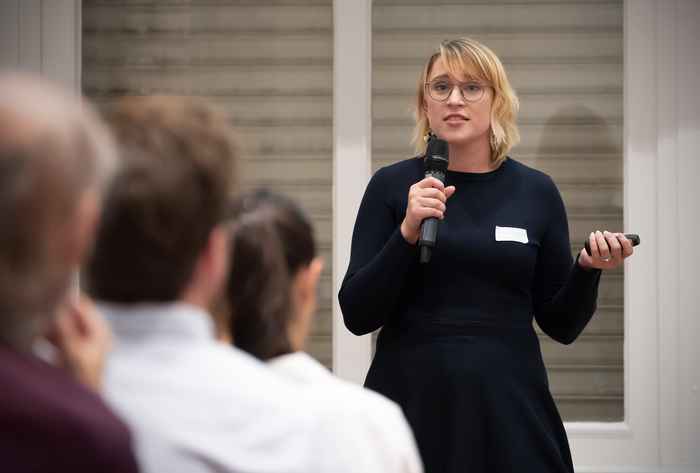Data Science Day 2021
28 October 2021
On Thursday 7th October, the Data Science Centre (DSC) hosted the inaugural Data Science Day event. The hybrid event took place at the Allard Pierson Muesum with over 130 people attending online and in-person.
Morning workshops
The day started with two morning workshops led by Denny Borsboom and Marc Galland.

Workshop 1: Network approaches to multivariate data
In recent years, network analysis has been applied to identify and analyse patterns of statistical association in multivariate psychological data. In these approaches, network nodes represent variables in a dataset, and edges represent pairwise conditional associations between variables in the data, while conditioning on the remaining variables. This workshop provided an anatomy of these techniques, describes the current state of the art, and demonstrated the use of these techniques in the open statistics JASP software developed at the UvA.
Nothing is more motivating than learning about new techniques that open doors to be projects, from your nextdoor colleagues!Marcel Haas, Lead Data Scientist at UvA Business Intelligence

Workshop 2: Open Science with R
This workshop introduced open data science using R, RStudio and GitHub, enabling participants to work with data in an open, reproducible, and collaborative way. “Open data science” means that methods, data, and code are available so that others can access, reuse, and build from it without much fuss.
Both workshops included participants from six out of the seven faculties at UvA, demonstrating that data science techniques can be applied to all domains and areas of research.
Afternoon Event

Supporting Data-Driven Research at UvA
The afternoon was kicked off by Paul Groth, scientific director of the DSC and Max Haring, head of the research and teaching support team at the Library UvA-HvA. As core members of the DSC team, they discussed the aims of the DSC and how the Library plays a pivotal role in supporting data-driven research
Artificial Intelligence for Scientific Discovery
Bernd Ensing, director of the AI4Science Laboratory, gave a talk on the lab, a multidisciplinary initiative in the Faculty of Science launched in the summer of 2019. The lab aims to connect experts of AI and machine learning with researchers in all fields of science. Bernd discussed what they have learned so far and what exciting opportunities the future holds.

Data-Driven Research Right Now - Pitch Presentations
10 researchers from five different faculties at UvA had three minutes to present the data-driven research they are doing right now, showcasing how data science is enabling them to level up their research.
-
Joanna Strycharz
Digital vulnerabilities and targeting -
Marc Galland
Data science goes green -
Thomas van Binsbergen
Designing systems to support data science and data management -
Tessa Blanken
Big behavioural data: Behavioural data-science solutions to COVID-19 -
Leon van Wissen
Data-driven research in the Faculty of Humanities -
Anna Keuchenius
The Computational Social and Behavioural Science Community -
Pim van Ooij
Clinical implementation of artificial intelligence technology in radiology -
Dick den Hertog
Analytics for a Better World -
Susanne Baumgartner
Smart Tracking -
Frans van der Kloet
How neural networks can be used when fitting biological systems/data
Keynote: Understanding beautiful places and wellbeing with AI
Suzy Moat, Professor of Behavioural Science and Co-director, Data Science Lab at Warwick Business School gave the keynote address. Suzy's research investigates whether data on our usage of the Internet, from sources such as Google, Twitter, Wikipedia and Instagram, can help us measure and predict human behaviour.
Her work touches on problems as diverse as generating rapid indicators of disease spread, estimating crowd sizes, and evaluating whether the beauty of the environment we live in might affect our health and happiness.
In her keynote address, Suzy explored the question of whether beautiful environments are good for our health and happiness? She described how millions of ratings from an online game called ‘Scenic-or-Not’ and a mobile app called ‘Mappiness’ have begun to offer new answers to this age-old question. Suzy explained how deep learning can help us understand whether beautiful places are simply natural places - or whether humans might be able to build beautiful places too.
You can watch all the talks from the afternoon event below.